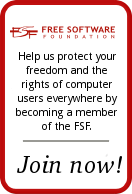September 2008
Monthly Archive
September 26, 2008
Well, I missed it. Did you?
Wednesday, September 24th was National Punctuation Day. I didn’t celebrate because I just found out about it today, Friday.
http://www.nationalpunctuationday.com/
I suspect you could still use this free resource next week or even later with the hope that students will remember the proper skills in their writing because you celebrated, even after the fact.
[Yes, I know. Punctuation isn’t really about open source software, but you don’t have to pay to use punctuation! Punctuation is part of our cultural commons. Knowing how to use it correctly improves our lives.]
September 15, 2008
Posted by Algot Runeman under
Open education
1 Comment
No I have not tried one; I admit I have only seen pictures and a demo video, but there is a new e-reader coming soon from a company called Plastic Logic (link includes a demo video). The company has a high volume factory which is starting to produce units this fall. The e-reader doesn’t officially have a name. But by early 2009 this may be the reader against which to compare the others. The device is targeted for business, but this might be great for the business of education, too.
- It appears to be open format that allows for many document types, including PDF, Word, PowerPoint (OpenOffice native?).
- Can store a briefcase full of documents.
- It is light and thin (about like a pad of writing paper).
- Device is 8 1/2 by 11 inches and the readable screen seems to be about 2 inches smaller each way.
- Advance and go back a page with a finger sweep across the page.
- It will have a virtual keyboard.
- It is durable, made of plastic-supported transistors (unlike glass-based laptop screens)
- Battery life is stated to be days not hours.
- Works in bright light (brighter the better).
Technology Review article: http://www.technologyreview.com/Nanotech/21372/
Desirable features not mentioned in reviews, etc.:
- Color
- WiFi connectivity for HTML/Web documents
- WiFi connectivity for document transfer from network storage
Stay tuned!
–Algot
September 13, 2008
Posted by Algot Runeman under
Open education
Leave a Comment
Open Source Software is part of a larger world of ideas. Not all ideas are expressed the way OSS is. The ideas are seen as if they were privately owned.
Copyright began in the US as a limited monopoly of 14 years to encourage authors to create useful and original work. Since then Congress has gradually changed copyright several times. Ideas weren’t originally regarded as property, but now are commonly called “intellectual property” which gives the impression that somebody owns the idea, not just its expression.
The Canadian Broadcasting Company recently produced a radio program about copyright in the modern world. It is worth hearing. You might even want to download the MP3 and use it with your students to explore legal uses of the icons and expressions of modern culture. You might be surprised to find out how long copyright extends beyond its original limit of 14 years.
http://www.cbc.ca/ideas/features/who-owns-ideas/index.html
–Algot
September 6, 2008
Are you personally resistant to using Linux and Free/Open Source Software in schools? Is it reluctance at the district level that prevents you from jumping in?
Here is an interesting article to read.
http://itmanagement.earthweb.com/osrc/article.php/3769431
September 2, 2008
Welcome back to the 2008-2009 school year.
The good people at Open Office publish a regular email newsletter. Today’s edition included the following links to some very good tutorials about making the most of their fine office suite.
OpenOffice.org Tips and Tricks Part I
===================================
A little different and very good
“Using the free and open-source productivity suite OpenOffice.org can be a godsend for those that don’t want to hand over more money to Microsoft. Its word processor, spreadsheet, presentation, and database applications almost mirror that of the MS Office suite. …”
http://www.linuxplanet.com/linuxplanet/tutorials/6506/1/
OpenOffice.org Tips and Tricks Part II
===================================
Importing MS Office Custom Dictionary.
“… This part of the series will take you through the process of importing the custom dictionary of MS Office, setting OOo to always save in the MS Office format, and using MS Office. Ready, set, go! …”
http://www.linuxplanet.com/linuxplanet/tutorials/6515/1/
OpenOffice.org Tips and Tricks Part III
=======================================
Inserting Fontwork (WordArt)
Are you a WordArt fanatic? Can’t find an equivalent text effect creator in OOo? Well, you don’t have to fret any longer, OOo’s Fontwork feature is here to save your day. As Figure 1 shows, Fontwork creates text similar to WordArt.
http://www.linuxplanet.com/linuxplanet/tutorials/6519/1/
–Algot
